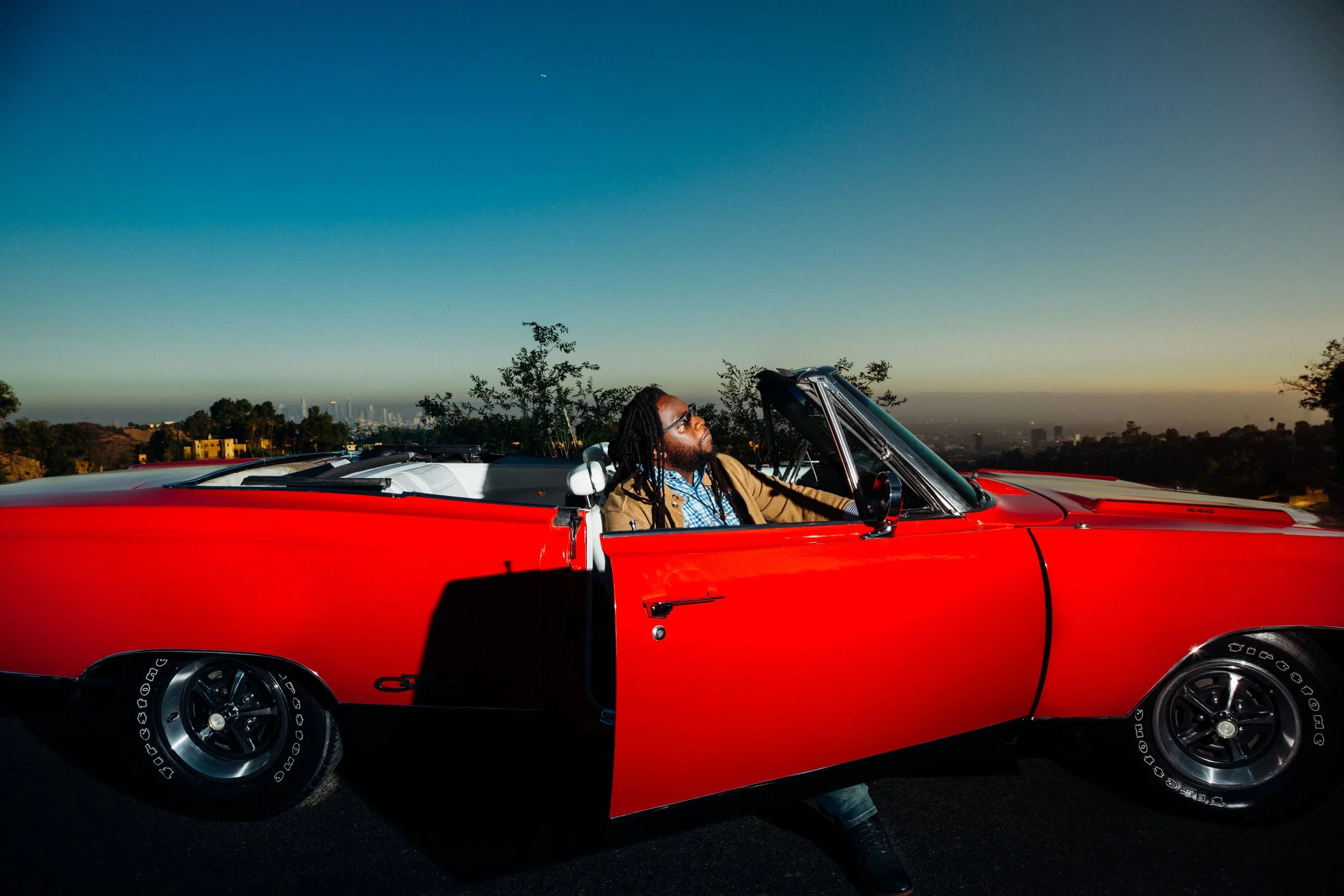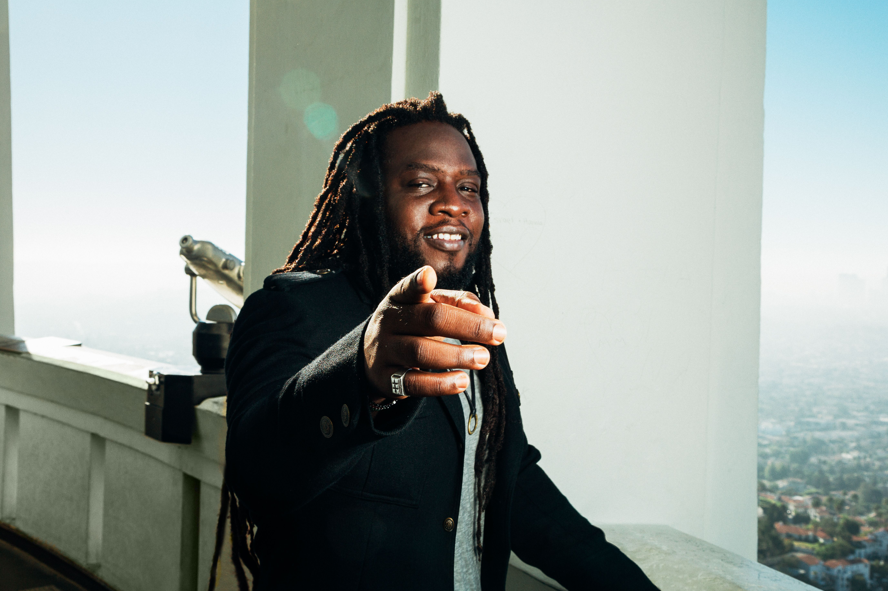Q&A: Mojo Morgan Reimagines a Musical Legacy with “Jamaica Love”
INTERVIEW
INTERVIEW
☆ BY DANIELLE HOLIAN ☆
GRAMMY AWARD-WINNING ARTIST AND FOUNDING MEMBER OF THE STORIED REGGAE DYNASTY MORGAN HERITAGE—Mojo Morgan has spent his career navigating the delicate balance between honoring tradition and forging new creative paths. He stands as a rare figure who bridges heritage and innovation with striking ease. With his latest project Jamaica Love, a deeply personal and genre-spanning EP released through Vydia, Mojo enters a pivotal moment in his journey, one that speaks as much to his own evolution as it does to reggae’s expanding place in the global conversation.
For Morgan, music has always been more than entertainment; it is both inheritance and vocation. Born in Brooklyn, N.Y. and raised in Springfield, M.A., he grew up straddling two worlds. On one side stood the American dream: hip-hop on the block, Top 40 radio in suburban bedrooms, the cultural diversity of the Northeast. On the other stood the ancestral pulse of Jamaica, the sound of roots reggae, the spirituality of Rastafari and the indelible influence of his father, the late reggae pioneer Denroy Morgan. This dual upbringing shaped an artist who moves fluidly between genres, cultures and identities.
From the outset of his career with Morgan Heritage, Mojo was part of a group that restored roots reggae to international prominence while proving its adaptability in a rapidly globalizing world. Alongside his siblings, he helped shape an aesthetic that was faithful to tradition but also contemporary in scope, authentic in message yet ambitious in reach. It is this same spirit of both preservation and innovation that guides his solo work today.
With Jamaica Love, Morgan presents his most intimate and adventurous project to date. He calls the sound “Rasta Rock,” a bold fusion of roots reggae, dancehall, rock, hip-hop, country soul and pop sensibility. The phrase itself is telling: at once deeply anchored in reggae’s spiritual consciousness and unapologetically open to global influences. It is an invitation to listeners to hear reggae anew, not as a static genre, but as a living, breathing language of resilience, joy and love.
Morgan’s Jamaica Love arrives with a poignant weight, marking his first solo chapter since the passing of his brother and bandmate, Peetah Morgan, whose spirit resonates throughout the project. In tracks like “Dreams,” Morgan channels Peetah’s enduring presence as a reminder that purpose transcends mortality, shaping an EP that is as much about healing and legacy as it is about rhythm and melody. Its sonic palette mirrors this expansive vision, weaving together collaborations with global dancehall heavyweights like Popcaan and Chronic Law, reggae stalwarts such as Sizzla and Gramps Morgan, and unexpected infusions of Afro-fusion, rock, hip-hop, and Americana. The result is a mosaic of sound, diverse in texture yet unified in its message of resilience, love, and the strength found in cultural harmony.
What makes Mojo Morgan’s path so compelling is the delicate balance he strikes between carrying a legacy and carving out new ground. As the son of Denroy Morgan and a member of reggae’s storied lineage, he feels the weight of history, yet he refuses to let tradition become confinement. For him, reggae’s vitality lies in its ability to adapt, to absorb new sounds and contexts without losing its spirit. His idea of “Rasta Rock” isn’t a departure from the roots but an affirmation of reggae’s reach, its ability to serve as a bridge, an experiment, and a continuum all at once. “I’m an artist, but I’m also a father, a son, and a visionary,” he reflects. “My mission is to inspire, not just with my voice, but with how I live, what I build, and how I lead.” Jamaica Love embodies that ethos: at once personal and universal, intimate yet expansive, a work firmly grounded in heritage while pointing boldly toward the future.
Keep reading for a conversation with Mojo Morgan as he reflects on legacy, love, and the next chapter in his ever-evolving musical journey.
LUNA: Thank you for sitting down and talking with Luna. Our readers would love to get to know you and your music. For anyone who isn't familiar yet, what inspires your artistic style and creative persona?
MOJO MORGAN: My style is inspired by both legacy and freedom. I grew up in a family where reggae was our foundation, but I was also shaped by hip-hop in Brooklyn, Top 40 radio in Springfield and roots culture in Jamaica. That blend gave me the confidence to create Rasta Rock. A sound that honors reggae while embracing rock, Americana and global influences.
LUNA: Congratulations on your new solo release, Jamaica Love. This is your first release since the passing of your brother Peetah. How did his spirit and influence guide you during the making of this project?
MORGAN: Peetah’s voice and energy are with me every day. His passing was a reminder that our time is short, but our purpose is eternal. “Dreams,” especially, were written in his spirit, about never giving up, no matter the obstacles. The whole project is dedicated to him and to carrying forward his light.
LUNA: You’ve described Jamaica Love as a project about love in every form. Can you talk about how each song embodies a different kind of love?
MORGAN: Each song explores a different kind of love: “Dreams” is about self-belief, “By My Side” is about family and loyalty, “Mountain Song” is about love for home, “Make It” is about ambition, “Man of Action” is about resilience, “In The Morning” is about love for cannabis, and Jamaica Love itself is pride in our country. Together, they form a mosaic of love’s many faces.
LUNA: The opening track, “When The Father Calls,” samples Haile Selassie. Why was it important to begin the EP with his words, and how do they tie into your message today?
MORGAN: Selassie’s 1963 UN speech is timeless. Beginning the EP with his call for disarmament and equality reminds us that peace and justice aren’t just history—they’re still urgent today. It sets the spiritual tone for everything that follows.
LUNA: You coined the term “Rasta Rock” to describe your sound. What does that mean to you, and how do you see it shaping the future of reggae?
MORGAN: It’s reggae at the core, but with the freedom to draw from rock, country and hip-hop. It’s about breaking boundaries while carrying forward the message of consciousness and love. I see Rasta Rock as a bridge between reggae’s roots and the global stage.
LUNA: Growing up as the son of reggae pioneer Denroy Morgan, what lessons from him do you carry most into your solo work today?
MORGAN: My father taught me discipline, faith and vision. He showed me that music is bigger than entertainment—it’s a calling. Those lessons guide every lyric I write and every project I take on.
LUNA: Morgan Heritage has always been about unity and family. How did working with your children and nephew on Jamaica Love expand that legacy across generations?
MORGAN: Having Kelib, Esh, and Jemere on this project made it generational. It’s not just about me stepping out solo; it’s about showing that the Morgan Heritage legacy continues to evolve. It’s powerful to see my children and nephew carry the torch in their own voices.
LUNA: Do you feel a responsibility as a Morgan to carry reggae’s torch, or is your goal more about breaking boundaries and reimagining the genre?
MORGAN: Both. I respect the responsibility of being a member of Morgan Heritage as a torchbearer, but I also believe reggae’s strength is its ability to evolve. My job is to honor the roots while showing that reggae can fuse with other genres without losing its essence.
LUNA: Your inspirations range from Bob Dylan and Peter Tosh to 2Pac, Coldplay, and Vybz Kartel. How do you balance such diverse influences while keeping your sound authentic?
MORGAN: For me, it’s natural. The Cranberries, Bob Dylan, 2Pac, Coldplay, Biggie—they all shaped me. I don’t force the balance; I just let the influences flow, and reggae becomes the foundation that ties them all together.
LUNA: Jamaica Love features collaborators like Popcaan, Sizzla, Gramps Morgan, and Chronic Law. What was the energy like bringing these voices together on one project?
MORGAN: It was electric. From Popcaan and Chronic Law to Sizzla and Maino, everyone brought their own energy. It was important to create space for those voices while still keeping the vision cohesive. The diversity of collaborators made the EP feel global and timeless.
LUNA: You’ve blended reggae, dancehall, hip hop, country, and Americana on this EP. Was there a moment in the studio where you knew this fusion was truly working?
MORGAN: Yes, recording “By My Side.” Hearing Afro-fusion elements blend seamlessly with dancehall and family harmonies shows how synonymous African music is with dancehall.
LUNA: Losing a brother and bandmate can shift one’s perspective on life and art. Has this project changed the way you see your role as an artist?
MORGAN: Definitely. It reminded me that my role is not just to entertain but to inspire as a producer as well as a songwriter. After losing Peetah, the music became about legacy and healing as much as about rhythm and melody.
LUNA: In today’s world of conflict and division, how do you hope Jamaica Love contributes to conversations about peace and unity?
MORGAN: It’s a reminder that love is universal. Whether it’s self-love, family love, or love for your homeland, those values transcend borders. The EP is my way of saying peace starts with how we treat each other.
LUNA: What do you hope new listeners, maybe those who’ve never experienced Morgan Heritage before, take away from Jamaica Love?
MORGAN: I hope they feel uplifted and connected. Even if they’ve never heard Morgan Heritage before, I want them to find something in the songs that speaks to their own journey.
LUNA: How are you feeling in this current era of your career, and what does the rest of the year look like for you that you would love to share with Luna?
MORGAN: I feel renewed. This is the beginning of a new chapter, one where I get to explore my own voice while still honoring my family’s legacy. The rest of 2025 is about bringing Jamaica Love to the world through touring, visuals and continuing to expand the Rasta Rock sound.


